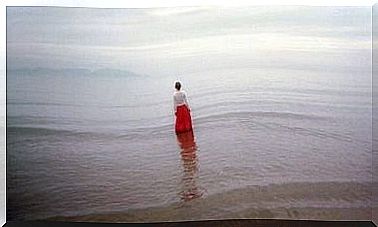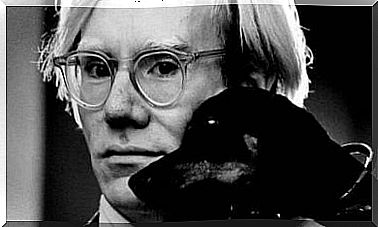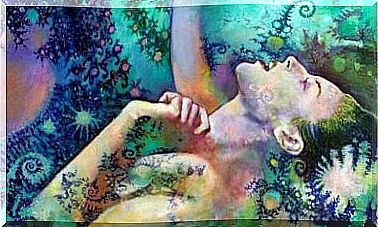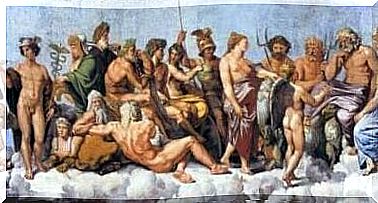Carl Jung’s Five Paths To The Key To Happiness

The key to happiness, according to Carl Jung, sounds just as real even decades later. The Swiss psychiatrist and father of analytical psychology was much more than just the man who left us with concepts such as archetypes and the collective unconscious. Jung was an expert in the complex alchemy of human emotions, images needs and the key to happiness.
“We are the origin of all evil,” he once said in an interview in the middle of the Cold War. He also once said, “I am not what has happened to me, I am what I choose to be”. He knew that people were capable of doing terrible things, but also excellent things. According to him, you can only achieve hope and well-being through individualization.
Carl Jung and the key to happiness
This interesting concept of individualization also has a strong connection to Jung’s concept of happiness. For him, it was a process that was about becoming mentally free.
You would then be able to live without fear or anxiety and become a whole person without something hidden away. Your unconsciousness would rise to the surface and you would have a clear sense of your goals.
This idea was undoubtedly the cornerstone of the uprising of spiritual psychological thinking. Jung also gave a simple list of the things he felt could lead a person to happiness. He did so during a series of interviews collected in the book CG Jung Speaking (1987).
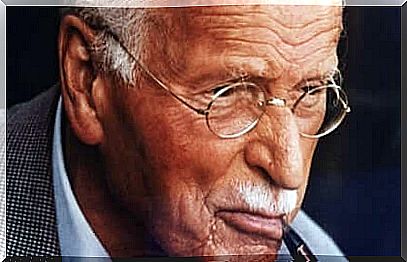
The key to happiness in 5 steps
There are tons of lists on how to achieve happiness. Many of them fall into the trap of positivity, which actually does not go very deep. They are not realistic, nor do they provide any concrete help. Carl Jung’s Key to Happiness may also seem simplistic, but there is one thing that sets it apart from other lists.
The father of analytical psychology said that if you blindly seek these five things as an obsession, you will end up achieving the opposite of their goal. What you need to do is set clear goals, but also be flexible, receptive and intuitive.
As Jung would have said, you need to be able to spot the synchronicities that can bring unexpected wonders into your life.
Let’s take a closer look at Jung’s five points for the key to happiness.
1. Good physical and mental health
You cannot have one without the other. In fact, Carl Jung believed that psychology was actually the only science that could save us as human beings and measure our well-being.
That said, he did not believe that the sole purpose of psychology was to treat mental disorders and pain. He also saw it as a tool to realize ourselves as human beings, clarify our goals and learn who we are. For him, it was as much one of the keys to happiness as bodily well-being.
2. Good conditions
The quality of your relationships with other people is a pillar you can find in any manual for happiness. It is not good to live life disconnected from other people. You need love, friendship, security and love. You need to communicate, share, discover new horizons, learn to nurture and nurture and create meaningful bonds.
3. The ability to perceive beauty in art and nature
Art is a cultural product made by people that is more than just an aesthetic creation. Each work of art also contains the essence of a human being. They have put their emotions, creativity, idealism, innovation and learning into things that started in their minds and in what Jung called the collective unconscious.
You need to be able to appreciate all that can elevate you, give you joy and make you happy. This also applies to being able to appreciate nature. Our roots are in nature. Every single creature and place on our planet can give you excellent wisdom if you know where to look.
4. Believe in something: A religion or a philosophy
For Carl Jung, there was no happiness without spirituality. Whether you were following a religious doctrine or a philosophical movement, he believed that believing in “something” could serve as a basis for well-being.
It gives each person an experience of a context and an origin, and makes you feel that there is more than the eye can see in this world. It gives you a sense of meaning and purpose.
5. An enriching job
Jung talked a lot about how he wanted to be an archaeologist when he was a child. But life ended up taking him on a path to study medicine and then specializing in psychiatry.
However, he still needed his passion for history, anthropology and a desire to “dig in” the deepest parts of humanity. But he did so through analytical psychology.
It is not always in your hands whether you have an enriching job or not. But if you can make the right choices about your career path with a clear sense of your goals, you will have an easier time finding an enriching job.
Ultimately, happiness is also about doing your best, and it’s easiest when you’re doing something you’m good at and passionate about.

The key to happiness: Conclusion
Socrates once said that you have to go down into the deepest parts of yourself to find happiness. In a way, it is not so different from what Jung suggested. The point is to become aware of your inner voice. Once you have done that, you can feel free and able to shape the life you want to live.


